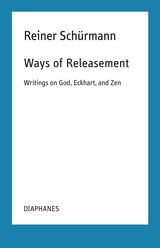15 start with P start with P

A central current in the history of democratic politics is the tensions between the political culture of an informed citizenry and the potentially antidemocratic impulses of the larger mass of individuals who are only marginally involved in the political world. Given the public’s low level of political interest and knowledge, it is paradoxical that the democratic system works at all.
In The Paradox of Mass Politics W. Russell Neuman analyzes the major election surveys in the United States for the period 1948–1980 and develops for each a central index of political sophistication based on measures of political interest, knowledge, and style of political conceptualization. Taking a fresh look at the dramatic findings of public apathy and ignorance, he probes the process by which citizens acquire political knowledge and the impact of their knowledge on voting behavior.
The book challenges the commonly held view that politically oriented college-educated individuals have a sophisticated grasp of the fundamental political issues of the day and do not rely heavily on vague political symbolism and party identification in their electoral calculus. In their expression of political opinions and in the stability and coherence of those opinions over time, the more knowledgeable half of the population, Neuman concludes, is almost indistinguishable from the other half. This is, in effect, a second paradox closely related to the first.
In an attempt to resolve a major and persisting paradox of political theory, Neuman develops a model of three publics, which more accurately portrays the distribution of political knowledge and behavior in the mass population. He identifies a stratum of apoliticals, a large middle mass, and a politically sophisticated elite. The elite is so small (less than 5 percent) that the beliefs and behavior of its member are lost in the large random samples of national election surveys, but so active and articulate that its views are often equated with public opinion at large by the powers in Washington. The key to the paradox of mass politics is the activity of this tiny stratum of persons who follow political issues with care and expertise. This book is essential reading for concerned students of American politics, sociology, public opinion, and mass communication.
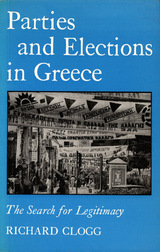

Are American political parties on the way out? Political action committees (PACs) currently compete with parties for influence over candidates and voters; persuading a more independent and volatile electorate requires new tactics; technological innovations afford more sophisticated means to appeal for support. Many political observers express doubts about the ability of political parties to adapt to these changes and to survive, but Paul Herrnson instead suggests their survival and resurgence in this balanced assessment of party activities in congressional elections.
Drawing on extensive interviews and survey data collected from nearly five hundred recent House and Senate candidates, campaign advisers, party officials, PAC executives, and journalists, Herrnson evaluates the roles of the national parties. He finds that from the perspective of party executives, they provide important campaign services and function as the key brokers between candidates, PACs, and other campaigners. For PAC officials, the national parties serve as important sources of strategic campaign information and cues for decision-making. For the candidates themselves, their parties function as appendages and accessories to their own campaign organizations.
Herrnson provides rich detail on party development and party campaign activity to predict the future of congressional elections and of the party-in-government and the party-in-the-electorate. Political practitioners as well as scholars will welcome this fresh, new contribution to a significant political controversy.
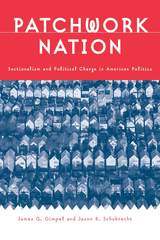
"A primer on the importance of regional identity in the electoral system. ... [A]nyone interested in learning more about how America's diversity drives its political systems would do well to take a spin through Patchwork Nation."
---Meg Kinnard, NationalJournal.com
"Location, location, location. What matters in politics is not just who the voters are, but where they are. Just ask Al Gore. Or read this book, a compelling demonstration that geography is often destiny."
---Bill Schneider, Senior Political Analyst, CNN
"This accessible and well-written book challenges us to reflect on the role that political context plays in shaping the vote. By tracing how regional politics evolves over time within and across states, Gimpel and Schuknecht have revived the important but often neglected field of political geography."
---Donald Green, Yale University
"In the spirit of V. O. Key, Gimpel and Schuknecht make a fundamental contribution. They demonstrate that states and regions are not simply important as units of aggregation, but rather as complex political arenas with profound consequences for processes of democratic politics both within and beyond their boundaries."
---Robert Huckfeldt, University of California, Davis
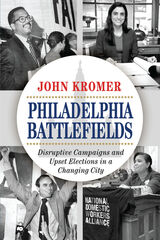
Should the surprisingly successful outcomes achieved by outsider candidates in Philadelphia elections be interpreted as representing fundamental changes in the local political environment, or simply as one-off victories, based largely on serendipitous circumstances that advanced individual political careers? John Kromer’s insightful Philadelphia Battlefields considers key local campaigns undertaken from 1951 to 2019 that were extraordinarily successful despite the opposition of the city’s political establishment.
Kromer draws on election data and data-mapping tools that explain these upset elections as well as the social, economic, and demographic trends that influenced them to tell the story of why these campaign strategies were successful. He deftly analyzes urban political dynamics through case studies of newcomer Rebecca Rhynhart’s landslide victory over a veteran incumbent for Philadelphia City Controller; activist Chaka Fattah’s effective use of grassroots organizing skills to win a seat in Congress; and Maria Quiñones-Sánchez’s hard-fought struggle to become the first Hispanic woman to win a City Council seat, among others.
Philadelphia Battlefields shows how these candidates’ efforts to increase civic engagement, improve municipal governance, and become part of a new generation of political leadership at the local and state level were critical to their successes.
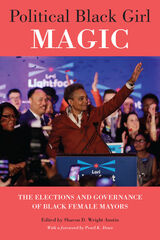
Case studies in this interdisciplinary volume include female mayors in Atlanta, Baltimore, Charlotte, Chicago, Compton, and Washington, DC, among other cities, along with discussion of each official’s political context. Covering mayors from the 1960s to the present, Political Black Girl Magic identifies the most significant obstacles black women have faced as mayors and mayoral candidates, and seeks to understand how race, gender, or the combination of both affected them.
Contributors: Andrea Benjamin, Nadia E. Brown, Pearl K. Dowe, Christina Greer, Precious Hall, Valerie C. Johnson, Yolanda Jones, Lauren King, Angela K. Lewis-Maddox, Minion K.C. Morrison, Marcella Mulholland, Stephanie A. Pink-Harper, Kelly Briana Richardson, Emmitt Y. Riley, III, Ashley Robertson Preston, Taisha Saintil, Jamil Scott, Fatemeh Shafiei, James Lance Taylor, LaRaven Temoney, Linda Trautman, and the editor
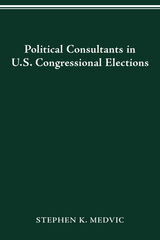
Political Consultants in U.S. Congressional Elections answers two simple questions: What do professional political consultants do? and How successful are they? Medvic analyzes the way consultants shape political dialogue and uses empirical data to show the benefits—and limits—of a consultant's involvement in a campaign. He focuses on issues as diverse as vote shares, outcomes, and fundraising. Finally, the author demonstrates how the adversarial nature of campaigns fosters the kind of electioneering advocated by most political consultants and argues that this process may not be as harmful for the country as is often suggested.

There can scarcely be a greater tribute to the vitality of the Fifth Republic's democracy than this monumental work. A searching analysis of how the will of the voters is translated into authoritative political decision making, this book not only uncovers political truths about contemporary France but also provides a model for the study of other popular forms of government.
The authors set out to find an answer to the perplexing question of how representative government operates in France in the seemingly unstable context of multiparties. By interviewing voters as well as legislators in 1967 and in 1968 after the great upheaval, and by monitoring policies of the National Assembly from 1967 to 1973, the authors test relationships between public opinion and decision making. They are able to sort out the abiding political cues that orient the French voter, to establish the normal electoral processes, to gauge the nature of mass perceptions of the political options available to voters, and to interpret the strikes, riots, and demonstrations of 1968 as a channel of communication parallel to the electoral process itself.
Lucid in style, methodologically sophisticated, and often comparative in approach, Political Representation in France is a seminal work for political scientists, sociologists, and historians.
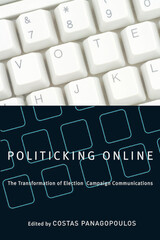
While the Internet may have transformed the landscape of modern political campaigns throughout the world, Costas Panagopoulos reminds readers that officials and campaign workers need to adapt to changing circumstances, know the limits of their methods, and combine new technologies with more traditional techniques to achieve an overall balance.
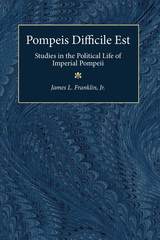
By collecting, sifting, and cross-referencing these varied documents, Franklin proves it possible to trace the major political alliances of the times, explore the remains of their houses, and find traces of their personalities. A few families, like the powerful Holconii, developers of the region's most famous grape vine, prove to have been steady players throughout Pompeii's history; but most families rose and fell within two generations at most. Chapters examine the men and families most prominent in each imperial period, including an analysis of their houses, and concludes with family trees. The documents themselves, elsewhere difficult to access, are prominently featured and translated in the text, making these discussions available and vivid to all readers.
This book is the first such attempt to cross-reference and animate all kinds of writing found at this legendary site. Outside of the city of Rome itself, this is the largest collection of writing from Roman antiquity, and it has lain mostly unexamined in the course of three centuries of excavations at Pompeii. This volume will interest not only students of Pompeii and classical scholars, but also historians, political scientists, sociologists, and enthusiasts of human behavior of all eras.
James L. Franklin is Professor of Classical Studies, Indiana University.
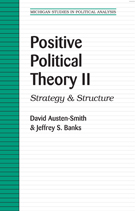
other book like it.”
—Norman Schofield, Washington University
“The authors succeed brilliantly in tackling a large
number of important questions concerning the
interaction among voters and elected representatives
in the political arena, using a common, rigorous
language.”
—Antonio Merlo, University of Pennsylvania
Positive Political Theory II: Strategy and Structure
is the second volume in Jeffrey Banks and David
Austen-Smith’s monumental study of the links
between individual preferences and collective choice.
The book focuses on representative systems, including
both elections and legislative decision-making
processes, clearly connecting individual preferences to
collective outcomes. This book is not a survey. Rather,
it is the coherent, cumulative result of the authors’
brilliant efforts to indirectly connect preferences to
collective choice through strategic behaviors such as
agenda-selection and voting.
The book will be an invaluable reference and teaching
tool for economists and political scientists, and an
essential companion to any scholar interested in the
latest theoretical advances in positive political theory.

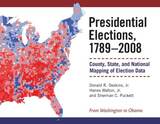
"Hanes Walton, Donald Deskins, and Sherman Puckett have produced a highly impressive collection and valuable contribution to the literature on American electoral politics. This work is indispensable for academic libraries, political scientists, historians, and serious students of American government."
---Immanuel Ness, Professor, Department of Political Science, Brooklyn College, City University of New York
"Massive amounts of information about presidential elections which are not readily available elsewhere. Unprecedented coverage in one volume of every single American presidential election."
---James Gimpel, Professor of Government, University of Maryland
"This is an extraordinary research endeavor; the most comprehensive set of aggregate election data ever assembled. Painstakingly researched, this color-coded volume presents data for every presidential election from 1789 to 2008. Unlike most, the wide ranging narrative for this atlas identifies racial patterns in the vote. Everyone who studies or is interested in presidential elections should have this impressive collection of statistical data in their libraries. A visual gem for the digital age."
---Robert Smith, Professor of Political Science, San Francisco State University
"Presidential Elections, 1789–2008 is a genuine tour de force that captures in an extremely accessible and comprehensive way the electoral geography of America's presidential elections, from Washington to Obama. An invaluable addition to the library of all those interested in presidential elections and U.S. politics."
---Marion Orr, Frederick Lippitt Professor of Public Policy and Professor of Political Science, Brown University
"This volume sets an extraordinarily high standard in scholarship, completeness, description, and explanation of our political process. It has been said that all politics are local, but never before has this been demonstrated with such clarity and panache, using the simple method of standardized tables summarizing voting, then showing state and county breakdowns of the numbers, greatly strengthened by beautiful full-color maps and cartograms. Every scholar of politics and democracy will benefit from the work laid out in this volume."
---Keith Clarke, Professor of Geography, University of California, Santa Barbara
Presidential Elections is an almanac of the popular vote in every presidential election in American history, analyzed at the county level with histories of each campaign, graphs, and stunning four-color maps. Most Americans are familiar with the crude red state/blue state maps used by commentators and campaign strategists---and even, for want of an alternative, by many academics. In providing a higher-resolution view of voting behavior the authors of this new volume enable examination of local and regional political trends that are invisible in state-level aggregations.
Presidential Elections will enable scholars to more subtly analyze voting behavior, campaigns, and presidential politics; commentators will use it to analyze trends and trace the historical evolution of new coalitions and voting blocs; strategists will use it to plan campaigns and mobilize constituencies. Presidential Elections will become the standard almanac on the subject: a required resource for academic and public libraries, as well as for scholars, consultants, and pundits nationwide.
Donald R. Deskins, Jr., is a political geographer and Emeritus Professor of Sociology and a former Associate Dean of the Horace H. Rackham School of Graduate Studies at the University of Michigan.
Hanes Walton, Jr., is Professor of Political Science at the University of Michigan. He also holds positions as Senior Research Scientist at the Center for Political Studies and as a faculty member in the Center for Afroamerican and African Studies.
Sherman C. Puckett is a Ph.D. graduate of the University of Michigan in urban and regional planning. He was a mayoral appointee in the data processing department of the Coleman A. Young administration in the City of Detroit and recently retired from Wayne County government as manager of technology, geographic information systems, and development of maintenance management systems.
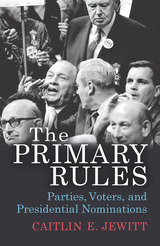
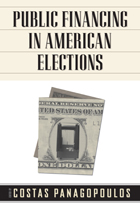
Reformers argue that public financing of campaigns will help rescue American democracy from the corruptive influence of money in elections. Public Financing in American Elections evaluates this claim and aims to remove much of the guesswork from the discussion about public finance.
Featuring some of the most senior scholars in political science and electoral studies, this book provides an up-to-date treatment of campaign finance research and thinking about public campaign financing reforms. Exploring proposals at the local, state, and federal levels, the contributors provide a comprehensive overview of public financing initiatives in the United States and discuss their impact. Focused analyses of several current public programs are also presented.
READERS
Browse our collection.
PUBLISHERS
See BiblioVault's publisher services.
STUDENT SERVICES
Files for college accessibility offices.
UChicago Accessibility Resources
home | accessibility | search | about | contact us
BiblioVault ® 2001 - 2024
The University of Chicago Press





